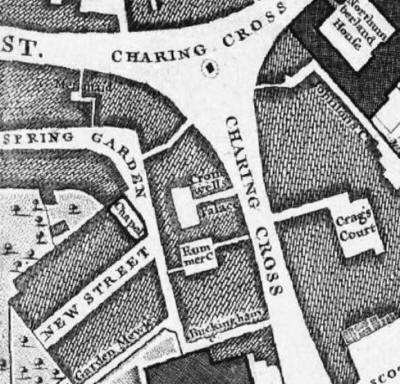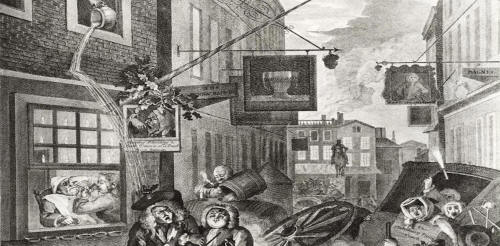

Search london history from Roman times to modern day
A historical site about early London coffee houses and taverns and will also link to my current pub history site and also the London street directory
THE RUMMER TAVERN.

Rummer court, Charing Cross in 1746 -
John Rocque map
The locality of this noted tavern is given by Cunningham, as "two doors from
Locket's, between Whitehall and Charing Cross, removed to the water-side of
Charing Cross, in 1710, and burnt down Nov. 7th, 1750. It was kept in the reign
of Charles II., by Samuel Prior, uncle of Matthew Prior, the poet, who thus
wrote to Fleetwood Shephard :
" My uncle, rest his soul ! when living,
Might have contriv'd me ways of thriving :
Taught me with cider to replenish
My vats, or ebbing tide of Rhenish.
So when for hock I drew prick t white- wine,
Swear't had the flavour, and was right wine."
Matthew Prior (born July 21 1664) :
Another Westminster boy ! not trained, however, by Ben Jonson's kind preceptor, Camden, but by the venerated Dr. Busby, whose beautifully-sculptured monument is to be found to the right, as you cross to the screen of the choir. Losing his father at an early age, Prior was transferred to the care of an uncle, who then kept the Rummer Tavern, the site of which is in the rear of No. 14, Charing Cross.
By this uncle was Matthew sent to Westminster School. Returning to his uncle's abode, he was one day discovered by the Earl of Dorset reading Horace at the window of the Rummer Tavern; and by this nobleman's kindness he was enabled to study four years at Cambridge. Matthew Prior subsequently rose to distinction both as a poet and as a diplomatist. He became a member of the senate appending
to his own name his own initials—and was likewise employed as an ambassador;
but after narrowly escaping an impeachment, these honours flew away, leaving
him to begin the world afresh, with an exchequer minus the cost of a dinner!
He had now reached the age of fifty-three, but abilities and friends were
still his own. Milton sold his divine epic for a few pounds; but Prior, from
a publication of his own poems, realised £4000. Fortunate poet! A similar
sum to that produced by his compositions was presented him by the Earl of
Oxford, which enabled him to purchase an estate in Essex, where he passed
the remainder of his days. Prior left £500 for a monument, which few can
fail to perceive on entering “ Poets' Corner." - Relics of genius by T
P Grinsted

The Night - Hogarth and the Rummer Tavern opposite the Cardigans Head
The Rummer is introduced by Hogarth into his picture of " Night." and that a night of rejoicing, viz. the 29th of May; evident from the bonfires, the oaken bough upon the barber's pole, and the oak leaves fixed in the freemasons' hats. The scene is taken from the narrow part of Charing Cross, as it formerly stood before the way was widened, looking from Whitehall, and exhibits the Rummer Tavern on one side, and the Cardigan's Head on the other ;
at that time two noted bagnios. We see here the Salisbury flying coach, just set out from the inn, overturning, and its passengers in the utmost fright, increased by the entrance of a burning serpent into the coach, thrown by some unlucky boy. On the other side a waiter is leading home a freemason in his apron, overpowered with liquor, who, by a cut on his face, is shewn to have been in a fray; he is scarcely out of one dilemma, before he is in another, for a maid, from a window in the Rummer Tavern, is showering her favours upon his head. On the right of this man is the house of a barber surgeon, illuminated with candles, whose sign is a hand drawing a tooth, the head in exquisite pain; beneath is written, “ Shaving, bleeding, and teeth drawn with a touch.” “Ecce signum,” behold the sign. An emblem of the operator's abilities. And through the window we have a view of the joint operation of shaving and bleeding, by a drunken ʼprentice. Beneath is a beggar's bagnio, a place to which such poor wretches as cannot find a better lodging, are obliged to resort in common. Though dark, we are able to discern these poor creatures by the light of the boy's link, which he is blowing in order to kindle a squib. Behind is a nightman, employed in his profession ; and further back, a family carrying off their goods by stealth, fearing they should fall a prey to their landlord.
Here Jack Sheppard committed his first robbery by stealing two silver spoons.
On September 17th 1738, or shortly before that date is recorded that : "Last Monday morning died Mr Finch, Master of the Rummer Tavern, Charing Cross." - Exposition on the Common Prayer 1737.
The 1805 Holdens directory places William Drought, at the Rummer Tavern, in Charing Cross.
We remember an old tavern, "the Rummer," in 1825, which was taken down with the
lower portion of St. Martin's lane, to form Trafalgar square.
A different Rummer, in Queen street, near to Cheapside.
On the 12th June 1774 is recorded the death of Mr Benjamin Braund, formerly master of the Rummer Tavern, in Queen street, near Cheapside. - Political State of Great Britain Vol 48.
The Rummer, in Queen-street, was kept by Brawn, a celebrated cook, of whom Dr.
King, in his Art of Cookery, speaks in the same way as Kit-Kat and Locket.
King, also, in his Analogy between Physicians , Cooks, and Playwrights, thus
describes a visit : —
" Though I seldom go out of my own lodgings, I was prevailed on the other day to
dine with some friends at the Rummer in Queen-street Sam Trusty would needs have
me go with him into the kitchen, and see how matters went there He assured me
that Mr.
Brawn had an art, etc. I was, indeed, very much pleased and surprised with the
extraordinary splendour and economy I observed there ; but above all with the
great readiness and dexterity of the man himself. His motions were quick, but
not precipitate ; he in an instant applied himself from one stove to another,
without the least appearance of hurry, and in the midst of smoke and fire
preserved an incredible serenity of countenance."
Beau Brummel, according to Mr. Jesse, spoke with a relish worthy a descendant of
" the Rummer," of the savoury pies of his aunt Brawn, who then resided at
Kilburn ; she is said to have been the widow of a grandson of the celebrity of
Queen-street, who had himself kept the public-house at the old Mews Gate, at
Charing Cross. — See Notes and Queries, 2nd S., no. xxxvi.
References :
Lots of references are made to two sources on the
internet archive
:
Edward Callows, Old London Taverns &
John Timbs, Club life of London Volume 2
Trying to avoid privacy and cookie settings overwriting content